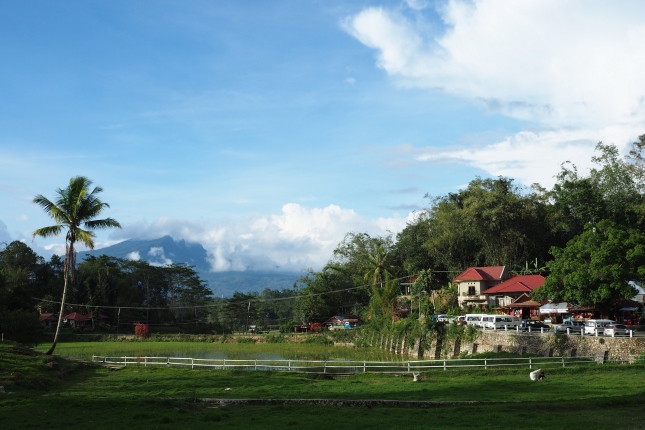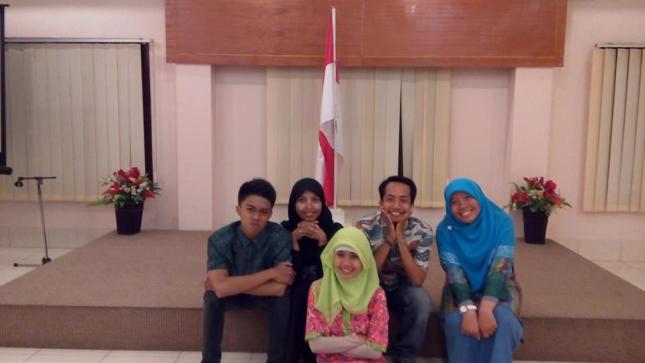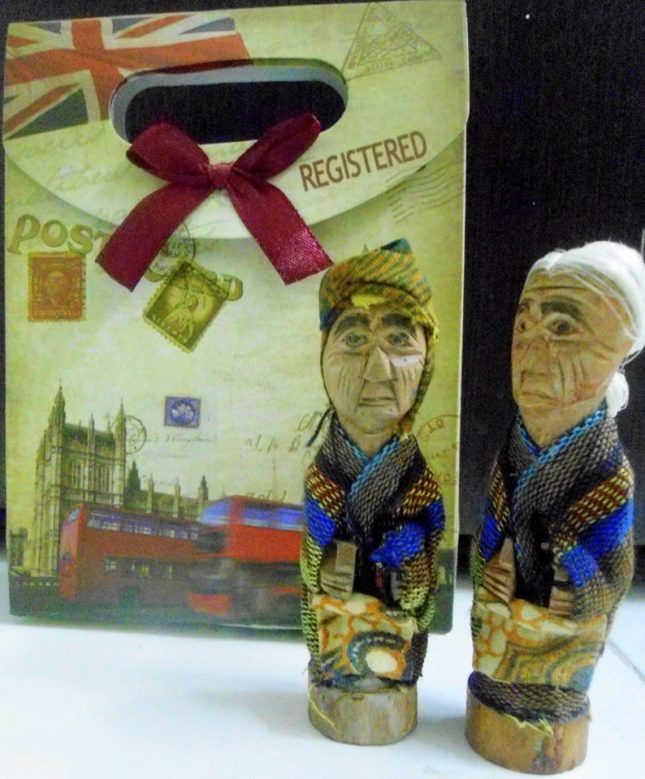Written by Nuranisa
Bahasa Indonesia:
Cerita ini saya tulis terinspirasi dari diskusi-diskusi kecil atau cerita-cerita lepas yang dilakukan bersama teman-teman dari Monash University di Malaysia. Awalnya saya agak bingung, artikel seperti apa yang akan saya sajikan. Dengan ini saya sudah tiga kali mengubah topik artikel. Artikel pertama dan kedua digugurkan dalam penulisan karena sifatnya yang terlalu faktual. Saya butuh beberapa referensi buku untuk membuat artikel ini menjadi kesatuan yang utuh dan secara layak dapat ditampilkan di blog tanpa ‘mengambil’ dari blog-blog yang ada sebelumnya. Akhirnya diwaktu-waktu terakhir batas pengumpulan artikel, idea ini muncul bagai malaikat penyelamat. Cerita yang saya angkat di sini lebih ke pengamatan dan analisa yang saya ambil hasil dari diskusi dengan teman-teman Monash University terkait bahasa, kebudayaan, agama, sistem pendidikan dan hal-hal umum serta hal remeh temeh lainnya. Melalui artikel ini saya akan mengelaborasi perbedaan-perbedaan maupun persamaan-persamaan antara Indonesia dan Malaysia.
Hal pertama yang saya bahas di sini adalah bahasa. Bahasa resmi Negara Malaysia adalah bahasa Melayu. Sebagian besar dari peserta “In Search of Makassar and Toraja” berkewarganegaraan Malaysia. Namun itu, saat mereka berbicara dengan sesama Malaysia, teman-teman Malaysia dari Monash University tetap berbicara dalam Bahasa Inggris. Kemudian saya berpikir, mereka pasti dari sekolah dasar hingga menengah bersekolah di sekolah internasional, sehingga telah terbiasa menggunakan Bahasa Inggris sebagai bahasa sehari-hari. Kemudian saya bertanya ke salah satu teman Monash, “apakah memang di Malaysia mereka juga menggunakan Bahasa Inggris sebagai bahasa sehari-hari?”. Ternyata hal bahasa saling berkaitan dengan agama dan suku. Mayoritas penduduk Malaysia beragama Islam, namun tidak sedikit juga yang beragama Kristen, Hindu, Buddha dan lain-lain. Malaysia tidak hanya sebagai rumah untuk orang Melayu saja. Ditilik dari sejarahnya, Semenanjung Melayu (yang dipanggil Tanah Melayu) tepatnya Malaka merupakan Bandar niaga internasional pada abad ke-16, sehingga Malaysia dikunjungi oleh pedagang-pedagang Arab, India, Cina, maupun Eropah. Mereka tidak hanya berdagang tapi kemudian tinggal menetap dan kawin mawin dengan penduduk lokal setempat hingga beranak cucu sampai sekarang. Sehingga Malaysia yang sekarang menjadi Negara majemuk yang menjadi tempat bagi warga Negara dari suku-suku bangsa berbeda.
Di Malaysia karena terdiri suku bangsa negara-negara dari seluruh dunia, bahasa yang berkembang kemudian pun terdiri dari bahasa-bahasa internasional. Berbeda hal dengan Indonesia, walaupun beberapa kali dijajah oleh negara luar, contohnya Belanda, Inggris, dan Jepang, akar budaya dan bahasa tidak begitu tertanam. Indonesia sendiri merupakan Negara yang sangat luas dan dengan sifat kedaerahannya yang tinggi. Bahasa daerah di Indonesia berjumlah ratusan, sehingga untuk mengikatnya menjadi satu kesatuan hadirlah bahasa Indonesia sebagai bahasa pemersatu bangsa. Bahkan, walaupun sudah ada sekolah-sekolah internasional, ketika bercakap-cakap dengan sesama Indonesia, mereka akan kembali berbicara bahasa Indonesia. Ambil kasus, jika orang Indonesia bersekolah di luar negeri dan bertemu dengan orang Indonesia lainnya mereka akan sangat antusias dan mereka akan menggunakan bahasa Indonesia walaupun mereka tahu bahasa Inggris untuk berkomunikasi.
Untuk sistem pendidikan antara Malaysia dan Indonesia pada umumnya hampir sama. Kedua negara ini memiliki sekolah negeri dan sekolah swasta. Namun, ada beberapa perbedaan kecil. Di Indonesia kita tidak mempunyai sekolah yang hanya boleh ditempati oleh orang Indonesia pribumi saja, dalam artian di Indonesia kita mempunyai warga keturunan Cina, Arab, India, Eropa dan lain sebagainya dan semuanya mempunyai hak untuk bersekolah di sekolah negeri. Tidak ada larangan atau regulasi dari pemerintah terkait hanya orang Indonesia pribumi yang dapat bersekolah di sekolah negeri. Di Malaysia, penuturan teman Monash University, terjadi ketimpangan dalam jumlah kuota penerima mahasiswanya, Orang Melayu dan bumiputra lain (orang asli/asal di Malaysia) mendapat kuota lebih besar dibanding orang keturunan lain kerana adanya Malaysian New Economic Plan. Di Malaysia menurut penuturan teman Monash University, sekolah negeri terbagi atas sekolah Melayu dan sekolah Cina dan bahasa penuturnya juga berbeda. Contohnya, Bahasa Cina digunakan untuk mata pelajaran seperti Matematik dan Geografi di sekolah Cina.
Untuk hal-hal umum maupun remeh-temeh lainnya antara kedua Negara ini diantara lain adalah:
- Di Malaysia sangat berbahaya bagi orang untuk mengendarai sepeda motor, berbeda dengan di Indonesia, akan sangat mudah melihat pengendara sepeda motor.
- Terdapat toko-toko yang antrean pembayarannya dibagi atas perempuan dan laki (mungkin di beberapa negeri di Malaysia). Di Indonesia sejauh ini saya belum pernah menemukan toko seperti itu.
- Pada gerbong-gerbong kereta api di Malaysia terdapat khusus untuk wanita. Kita tidak bisa menjumpai keadaan seperti ini di Indonesia.
—-
English:
The story that you are reading right now was inspired through small discussions that I have done with friends from Monash University in Malaysia. At the very beginning, I found it difficult to think about what kind of story I would like to share to all. This story is my third and final attempt at finally choosing my topic to share as my first and second stories mostly talk about the history of South Sulawesi which I have decided to not proceed further due to lack of references.
As I was not allowed to copy paste directly from blogs on the Internet as it was an act of plagiarism, I then decided to write about my observations instead which are basically collections of stories and experiences between my friends at Monash University and myself. We mostly talk on language, culture, religion, the education system and much more. However, for the purpose of this article, I will seek to compare these few topics between Malaysia and Indonesia.
The first topic that I will discuss is the topic on ‘Language’. The official language in Malaysia is Bahasa Malaysia. Most of the participants of ‘In Search of Makassar and Toraja’ are Malaysians, however, the main language they speak with each other are English. When I saw this, I thought to myself that perhaps the students studied in an international school their whole lives, so perhaps they are accustomed to using English as their main language for everyday use.
When I asked a friend from Monash whether it is accustomed for them to use English as their everyday language in Malaysia, I was told that languages are mainly related to religions and ethnicities. Although majority of Malaysia’s population is Muslim, there are also Christians, Hindus, Buddhists and other religions that citizens are free to practice. Same goes to ethnicities. So, Malaysia is not only home for the Malays or Muslims, but many others too. This is perhaps due to Malacca’s role as an international commercial port in the 16th Century (judging from history) where traders come from many places such as Arab, India, China and Europe. Not only do they trade in the then Tanah Melayu, but also settled down and married local villagers. Hence why present Malaysia is rich with citizens of different ethnicities, culture and languages.
Because Malaysia consists of many ethnicities from around the world, the languages spoken in Malaysia are varied. In contrast to Indonesia, although we are occupied several times by foreign countries such as the Dutch, British and Japanese, their cultural and linguistic roots are not embedded within our culture. Indonesia is a big country and the feeling of regionalism, where locals of different parts of Indonesia are mostly prone to speaking their own ‘region dialects’, it was important to bring forth Bahasa Indonesia as a unifying language between all its citizens. In fact, although there are many international schools in Indonesia, many of the students from those schools will still converse in Bahasa Indonesia when they speak to each other. For example, if there are Indonesian students who study abroad and meet other Indonesians there, they would enthusiastically converse in Bahasa Indonesia instead of English, despite being fluent in English.
The education system between Malaysia and Indonesia are about the same. Both countries have public and private schools. However, there are some minor differences. In Indonesia, citizens can attend school freely, especially public schools as they have the right to do so. In Malaysia however, according to my Malaysian friend, public universities are mostly given placement to Malays and Bumiputra due to a quota system as part of the Malaysian New Economic Policy. There are also schools specializing in different languages such as Bahasa Malaysia schools, Chinese schools and Indian schools where its subjects are taught in those languages. For example, Chinese-medium schools use Mandarin for many of its subjects such as Mathematics, Geography and etc…
Other general matters that differ between the two countries:
- In Malaysia it is very dangerous for people to ride a motorcycle, unlike in Indonesia, where you will see many motorcycles.
- There are shops where the payment line is divided for men and women (perhaps in some states in Malaysia). In Indonesia, I have never found a store like that thus far.
- The railway carriages in Malaysia have designated carriages especially for women. There is no such thing here in Indonesia.
Nuranisa is currently a third-year student doing her a Bachelor’s degree in Cultural Studies with a major in History in Hasanuddin University, Makassar, Indonesia. On her spare time, you can find her reading novels (especially her favourite, Sherlock Holmes), watching Korean drama and singing Korean songs.














